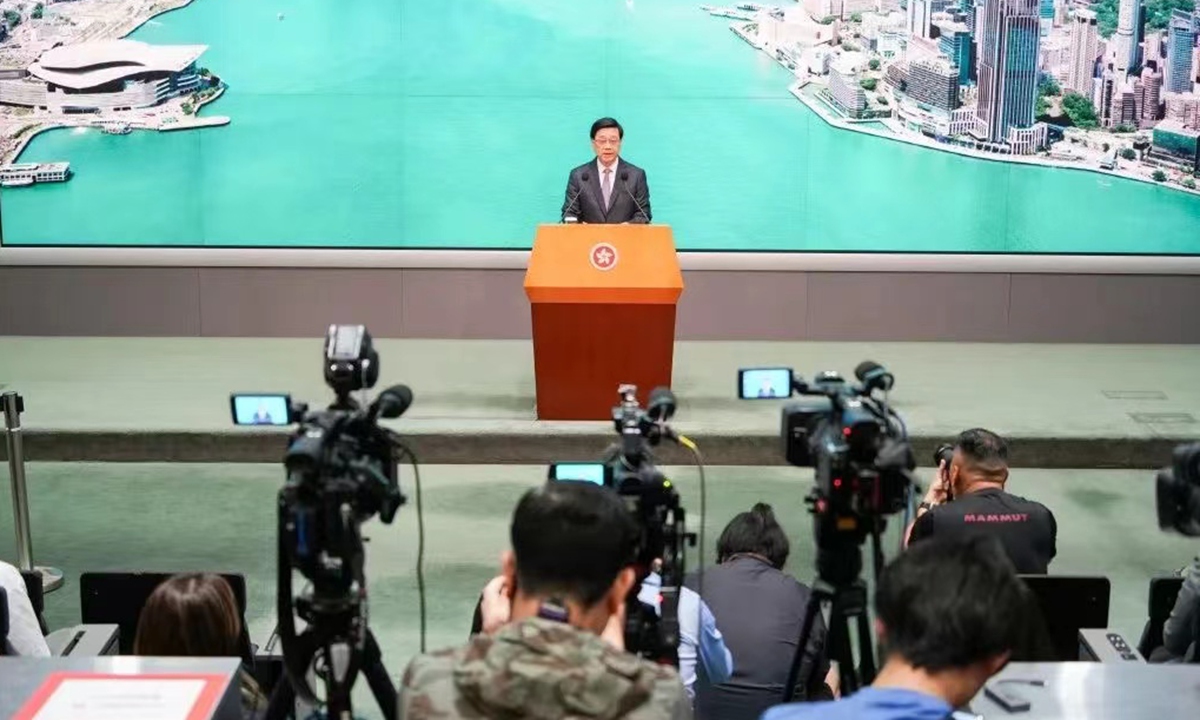
Hong Kong Special Administrative Region Chief Executive John Lee meets the press on March 26, 2024. Photo: stheadline.com
In response to the first case under the Safeguarding National Security Ordinance in Hong Kong, in which an activist known as "Captain America 2.0" was denied an early release since the enactment of the local national security law in line with Article 23, Hong Kong Special Administrative Region (HKSAR) Chief Executive John Lee said on Tuesday that it's standard practice not to grant sentence reductions to individuals convicted of endangering national security.
Ma Chun-man, an anti-government activist also known as "Captain America 2.0," has become the first national security prisoner denied an early release on Tuesday, according to local media reports. He was earlier sentenced to five years in prison for inciting secession, with his "good behavior" leading to a reduced sentence. Local media reported that Ma was due for early release on Tuesday from Tong Fuk Correctional Institution.
Since the enactment of the ordinance, the territory's Prison Rules have also been amended to include that if a prisoner serves a sentence in respect of the prisoner's conviction of an offense endangering national security, the prisoner must not be granted remission unless the Commissioner of Correctional Services is satisfied that an early release of the prisoner will not be contrary to the interests of national security.
These rules specify that prisoners convicted of an offense endangering national security must have the Commissioner of Correctional Services' endorsement that their release "would not be contrary to national security" to qualify for a reduction in sentence for good behavior, Lee told a press conference on Tuesday in response to the case.
He also pointed out that it is standard practice not to grant sentence reductions to individuals convicted of endangering national security.
Hong Kong Correctional Services was quoted as saying in local media reports on Tuesday that the ordinance has made amendments to the Post-Release Supervision of Prisoners Ordinance and Post-Release Supervision of Prisoners Regulation.
If a prisoner is serving a sentence for being convicted of crimes endangering national security, their case cannot be referred to the Post-Release Supervision Board for consideration unless the Commissioner of Correctional Services is convinced that their early release would not be detrimental to national security.
The regulations apply to all prisoners currently serving sentences for crimes that have been judged to endanger national security, regardless of whether their sentences were imposed before, on the day of, or after the amendments came into effect, the Correctional Services said.
It also noted that the Commissioner of Correctional Services, acting under the authority granted by the law, will strictly adhere to all relevant legal provisions, taking into account the actual circumstances and all relevant factors of each case, including the statements of incarcerated individuals, to ensure that all cases are handled fairly.
Lee also urged everyone not to engage in any behaviors or activities that endanger national security, as such actions generally do not result in a reduced sentence. Therefore, one should not test the law, he said.
Ma, who usually held the superhero's shield in the protests, is accused of advocating for "Hong Kong's independence" by shouting slogans and promoting such secessionist views during interviews with the media at 20 public events.
Generally, cases involving national security are considered serious crimes that cause significant social harm. If it cannot be ensured that the individuals involved no longer pose a threat to national security, reducing their sentences could cause great harm to society, Louis Chen, a member of the Election Committee and general secretary of the Hong Kong Legal Exchange Foundation, told the Global Times on Tuesday.
"It is an international norm that national security cases usually do not receive sentence reductions. Not reducing sentences is the norm, and reduction is the exception," he said.
In a separate case, Hong Kong's top court unanimously dismissed the appeal by a 26-year-old university student in 2023 after he sought to reduce his five-year sentence for pleading guilty to breaching the national security law in a landmark ruling. The court ruled that the minimum penalty of five years for those committing serious offenses as stipulated by the security law is mandatory, according to local media reports.
After the implementation of Article 23 legislation, criteria have become stricter, reducing the possibility of sentence reduction, Willy Fu, director of the Chinese Association of Hong Kong and Macao Studies and vice-president of the Hong Kong Basic Law Education Association, told the Global Times on Tuesday.
This approach aligns with the spirit of the rule of law, highlighting that sentencing has a deterrent and punitive effect, which effectively prevents and punishes actions and activities that compromise national security, firmly safeguarding national security and the prosperity and stability of Hong Kong, Fu said. "It is constitutional, legal, sensible, and reasonable, and deserves the support of the general public," he noted.




